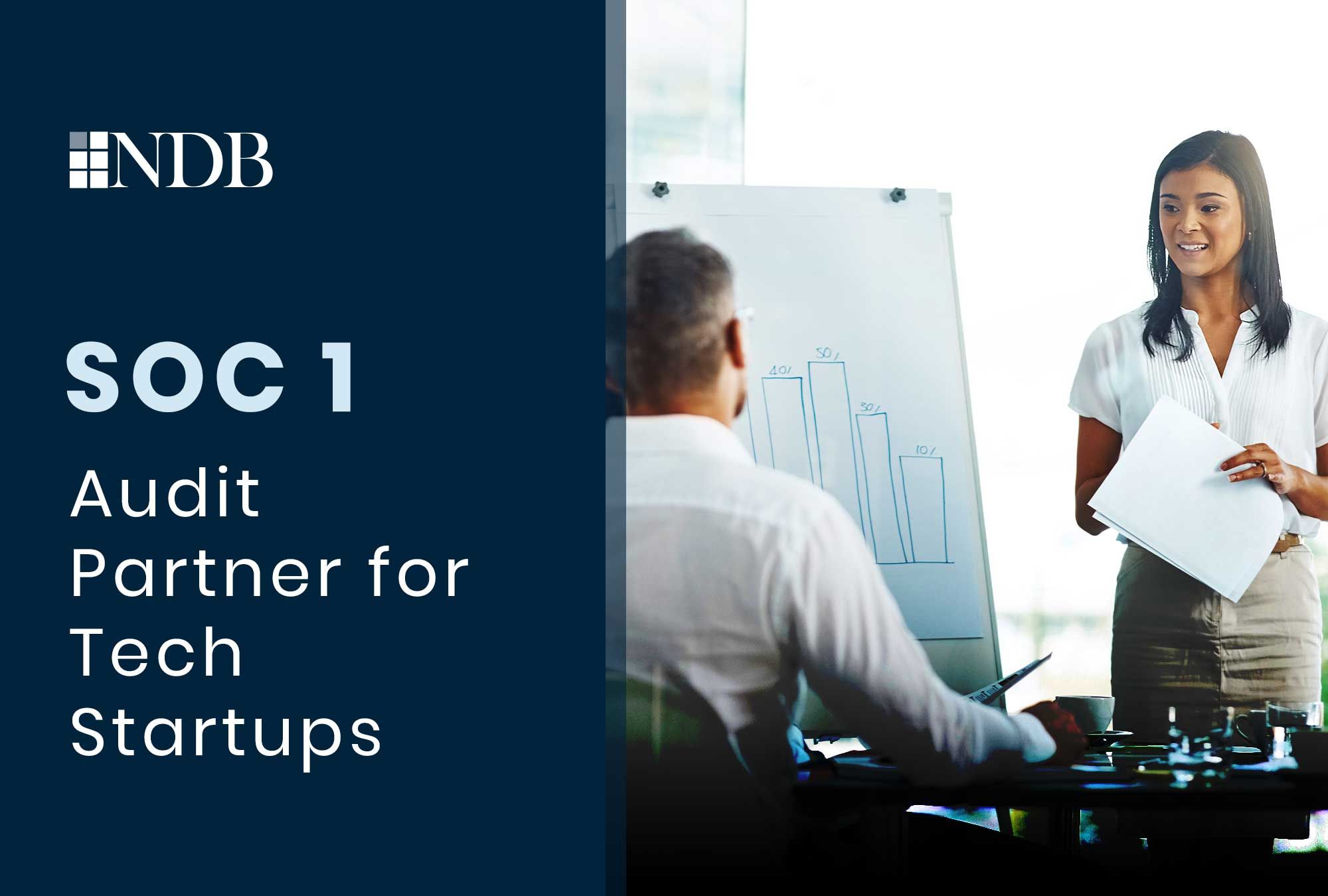SOC 1 Audit Partner for Technology Startups
As California continues to serve as the beating heart of the global tech industry, startups in the region are expected to meet increasingly rigorous standards of operational transparency and internal control. For companies that provide outsourced services affecting client financial reporting—such as SaaS platforms, FinTech firms, and data processors—SOC 1 compliance is becoming a critical component of doing business.
The SOC 1 audit, governed by the American Institute of Certified Public Accountants (AICPA), evaluates a service organization’s controls relevant to their clients’ internal control over financial reporting (ICFR). Achieving SOC 1 compliance can boost client confidence, support long-term growth, and even serve as a competitive advantage when bidding for enterprise contracts.
Enter NDB, California’s go-to audit firm for technology startups seeking fixed-fee, hassle-free SOC 1 audits. By offering deep expertise, startup-centric delivery models, and full-service readiness-to-report guidance, NDB enables companies to navigate the complexities of SOC 1 compliance without breaking stride on innovation.
Understanding SOC 1 Compliance: What It Is and Why It Matters
SOC 1 (System and Organization Controls 1) is a framework designed for service organizations that impact their clients' financial statements. Developed by the AICPA, SOC 1 reports are conducted under the SSAE 18 standard and are intended to provide assurance to user entities and their auditors.
There are two types of SOC 1 reports:
- SOC 1 Type I: Evaluates the design of internal controls at a specific point in time.
- SOC 1 Type II: Assesses the operating effectiveness of those controls over a defined period, typically 6 to 12 months.
Startups that store, process, or transmit financial data—or whose platforms impact clients' financial reporting processes—will likely be asked by customers, investors, or partners to provide a SOC 1 report. Examples include:
- SaaS companies that automate invoicing or payroll
- Cloud hosting providers with financial application clients
- FinTech platforms handling billing or accounting services
- Managed service providers (MSPs) with access to financial systems
A SOC 1 report serves as formal, third-party validation that an organization has effective controls in place. For startups, this can mean:
- Faster sales cycles with enterprise clients
- Reduced audit burden for customers
- Better positioning with VCs and acquirers
- Improved operational discipline internally
Challenges Faced by Startups Pursuing SOC 1
While the benefits of SOC 1 are clear, the road to compliance can be complex—especially for early-stage startups without dedicated compliance teams. Key challenges include:
- Lack of formal documentation: Startups often operate with agile, fast-moving practices and limited process standardization.
- Unclear control ownership: With small teams, roles are often blended, making it difficult to assign responsibility for specific controls.
- Audit anxiety: Founders and CTOs are often unfamiliar with audit language, expectations, and requirements.
- Budget constraints: Many audit firms charge premium hourly rates, which can quickly spiral out of reach for startups.
This is where NDB offers a unique and valuable proposition.
NDB’s Fixed-Fee SOC 1 Audit Model: Predictability Meets Expertise
NDB offers fixed-fee SOC 1 audits, providing transparency and predictability in cost without compromising quality. This model is especially appealing to budget-conscious startups in growth mode.
Whether your company is pursuing a Type I report for the first time or preparing for a more mature Type II audit, NDB offers end-to-end services at a flat rate, with no surprise fees. This empowers startups to plan their audit roadmap in advance and allocate resources efficiently.
Fixed-fee engagements cover:
- Readiness assessments
- Documentation support
- Internal control testing
- Type I or Type II audit execution
- Final reporting and guidance
By removing financial ambiguity, NDB helps California startups prioritize SOC 1 compliance as a growth enabler—not a financial burden.
SOC 1 Audit Services Designed for California Startups
NDB understands that startups don’t have the luxury of bloated compliance departments or unlimited audit budgets. That’s why their SOC 1 audit methodology is streamlined, collaborative, and tailored to the realities of modern, cloud-native businesses.
1. SOC 1 Readiness Assessment
Before diving into the audit, NDB conducts a readiness assessment to evaluate your current state against SOC 1 criteria. This step helps uncover:
- Missing or incomplete documentation
- Control gaps or weaknesses
- Ambiguous role responsibilities
- Misaligned or inconsistent processes
The assessment concludes with a detailed remediation roadmap, prioritizing actions based on risk, resource constraints, and audit timelines. For early-stage companies, this phase is critical—it allows teams to prepare confidently for the actual audit.
2. Control Framework Design and Documentation Support
SOC 1 audits require a clear and well-documented control environment. Startups often need help formalizing their controls in areas such as:
- Change management
- Access provisioning and termination
- Incident response and escalation
- Data backup and recovery
- System monitoring and alerting
- Logical and physical security
NDB’s consultants help startups create or refine control narratives, define owners, and align practices with SOC 1 standards—without overwhelming staff or disrupting workflows.
3. Audit Execution: Type I and Type II
Once controls are in place, NDB conducts the SOC 1 audit itself:
- SOC 1 Type I: A snapshot of control design at a specific date. Ideal for first-time audits.
- SOC 1 Type II: Involves continuous testing over 6-12 months to validate control effectiveness.
Throughout the audit, NDB maintains close communication with clients, offering coaching and clarification as needed. Evidence is collected collaboratively, using modern tools to streamline workflows and minimize business disruption.
Startups can expect:
- Efficient audit execution
- Clear status updates and timelines
- Minimal rework due to proactive support
At the conclusion of the audit, startups receive a formal SOC 1 report that can be shared with customers, partners, and auditors.
4. Post-Audit Support and Continued Compliance
SOC 1 compliance is not a one-and-done event. Over time, controls must evolve to keep up with organizational change, technology shifts, and scaling teams.
NDB provides ongoing post-audit support that includes:
- Control maturity assessments
- Continuous improvement planning
- Internal audit support for SOC 1 Type II
- Integration with broader compliance efforts (e.g., SOC 2, ISO 27001)
This ensures startups maintain their audit readiness and strengthen their risk posture year after year.
Expertise in Cloud and SaaS Environments
California’s startup ecosystem is overwhelmingly cloud-first. Whether operating entirely in AWS, Azure, Google Cloud, or hybrid models, startups must ensure their cloud environments meet SOC 1 expectations.
NDB brings deep experience in:
- IAM configuration and access controls in cloud platforms
- Infrastructure-as-Code (IaC) security
- DevOps processes and CI/CD pipeline governance
- Third-party integrations and vendor risk management
- Logging, monitoring, and SIEM solutions
By aligning security and compliance within your development lifecycle, NDB ensures SOC 1 is not just achievable—it becomes a byproduct of good cloud hygiene and engineering discipline.
Local Knowledge. National Reach.
NDB has built a strong presence in California’s tech corridors—including Silicon Valley, San Francisco, Los Angeles, San Diego, and Orange County. With years of experience supporting VC-backed startups, scale-ups, and IPO-ready tech firms, NDB understands the business, regulatory, and cultural nuances of operating in California’s hypercompetitive markets.
NDB’s team has supported startups across sectors:
- FinTech platforms needing to demonstrate controls for financial clients
- SaaS firms building enterprise trust through audit credentials
- Data analytics startups handling sensitive financial datasets
- AI and ML companies working in regulated environments
This localized expertise is combined with national audit credentials and AICPA compliance, giving startups the best of both worlds.
Why Startups Choose NDB for SOC 1
Startups choose NDB not only for audit execution—but for a partnership that prioritizes growth, transparency, and simplicity.
Key benefits include:
- Fixed-Fee Pricing: No hourly billing, no surprises. Transparent and startup-friendly.
- End-to-End Support: From readiness to reporting, NDB stays with you through every phase.
- Startup-Focused Approach: Tools, templates, and guidance built for lean, agile teams.
- Cloud and Tech Fluency: Deep knowledge of DevOps, automation, and modern IT environments.
- Responsive Service: A dedicated team that treats your audit like a collaborative project, not a checklist.
SOC 1 vs. SOC 2: What’s the Difference?
Many startups are unsure whether they need SOC 1 or SOC 2. Here's a quick breakdown:
- SOC 1 focuses on financial reporting impact, and is often requested by clients whose auditors need to rely on your controls.
- SOC 2 evaluates trust services criteria such as security, availability, processing integrity, confidentiality, and privacy.
NDB provides both services and can help you determine which framework (or combination) best suits
your market, client base, and strategic objectives.
Client Success Stories
NDB has guided numerous California startups through successful SOC 1 engagements. Examples include:
- A SaaS platform securing a multimillion-dollar enterprise contract after providing a clean SOC 1 Type I report.
- A FinTech firm streamlining its investor due diligence process by showcasing its control environment.
- A startup expanding into new verticals and differentiating itself through audit transparency.
Each success story reflects NDB’s ability to align compliance with business outcomes—not just regulatory requirements.
SOC 1 Compliance is a Growth Catalyst, Not Just a Checkbox
For California-based startups handling financially relevant operations, SOC 1 compliance is no longer optional. It's a vital proof point that can accelerate sales, attract investors, and establish your company as a trustworthy provider in a competitive market.
With NDB’s fixed-fee model, audit expertise, and startup-centric approach, SOC 1 compliance becomes not just achievable—but strategically valuable. From readiness assessments to audit reports and beyond, NDB empowers California tech companies to build operational excellence and win stakeholder confidence.
Ready to start your SOC 1 journey? Contact NDB to schedule a readiness consultation and learn how to turn compliance into a catalyst for growth.




